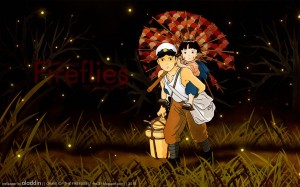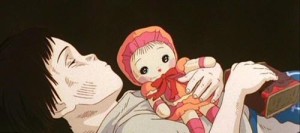Since the film Grave of the Fireflies was released, the debate that whether the theme of the film is anti-war or not had never ended. Audience, critics and even the director himself has been entangled in this heated debate.Apparently, people fall into two groups: the anti-war-theme group and the not-anti-war-theme group. Many audiences who have experienced the war time therefore burst into quantities of tears and they are anti-war-theme big fans. However, some critics and the director of this film repeatedly denied that the film was anti-war.Personally, I hold the same opinion with the director that the focus of this film is not anti-war.
Siyi Shen,130112129,class 1
People who are in the anti-war-theme group attribute their attitude to the graphic and emotional scenes in the film that were bloody and horrible: including the scenes about dead corpse and buildings in ruins. They said they shared the same feeling with the characters in the film because they had experienced just the same horrible historical event as the characters did which
 was still left in their mind and kept appearing in front of their eyes occasionally.
was still left in their mind and kept appearing in front of their eyes occasionally.
However, some critics and the director himself seemed to fail to agree with this kind of opinion. According to the director, he had just intended to convey to the audience an image of two children who lived a failed life because of isolation from society so that the sympathy could be invoked especially among the people in their teens and twenties. Because the director felt obliged to straight up these people through the film and make them show respect for their elders for all the pain and suffering the elders had gone through during the undoubtedly darkest period of Japan’s history.
Personally, I hold the same opinion with the director that the focus of this film is not anti-war.
First, this film was adapted from a book of the same name so it might be helpful to refer to the book and its author. According to the author of the book, he said he wrote this book just to convey a personal apology to his own sister who died from malnutrition during the World War Two. From this point of view we can find that since the film has paid more attention to individual memories and self-releasing rather than social cynical criticism, we can hardly say that the film adapted from it has a lot to do with a deeper, more extensive, critical anti-war-theme. Although we have to admit that the books and films adapted from them do not always share the same topic, however, in this case, they do because of the high conformity they share from plot to character setting.
Second, I do not agree with the opinion that the film’s theme is anti-war just because there exist bloody and terrifying scenes in this film. As well known, this film is set during the World War Two a war time. Therefore to depict the story more credibly, bloody and terrifying scenes in the war serve as a fundamental and indispensable role. Even though this kind of scenes exist, we can not say that they are thus the main trend or the theme of the film. In addition, it is not difficult for us to find that the film never focus on what horrible destruction the war has caused and how deeply the people detest the war. Instead, the director spends most of the time depicting the two children: Seita and Setsuko, just like what the director himself said: I had just intended to convey an image of the brother and sister living a failed life due to isolation from society and invoke sympathy particularly in people in their teens and twenties, whom I felt needed to straighten up and respect their elders for the pain and suffering they had experienced during arguably the darkest point in Japan’s history. From this, we can also say that the horrible war scenes exist to beautify and accentuate the two innocent and pure lives.

However, of course we have to admit that in this film we can feel the cruelty of the war and that we do feel sorry for Seita and Setsuko’s death and perhaps therefore denounce and accuse of the war. But as far as I am concerned, it is exactly what the films have in common of which the plots are set in a war time. But every film set in a war time has its focus and hence not every film set in a war time has to be an anti-war-theme film.
In my opinion, people who regard this film as an anti-war-theme film fail to distinguish the film’s theme from their own emotion. Many of them themselves have experienced the war time so it is unavoidable that they would feel more impressed and sentimental while watching the film. Since the film is adapted from a semi-autobiographical which is based on real people and real events, the audience’s empathy towards the war time might be easier to be aroused and thus the audience might be easily overwhelmed by their emotion. In this way, since the audience have been manipulated by their own emotion, it is understandable that the audience mix their own emotion with the theme of the film.
what‘s anti-war:http://zh.wikipedia.org/wiki/反戰
more information about world war two:http://baike.so.com/doc/335501.html




I give you thirty-two praises
观点鲜明,思想成熟稳重,能详细深刻表达自己关于电影是否为anti—war—theme的看法。很好,给赞一个。
Very well.
Very well
There are no permanent jobs on this planet; we are all interning here. Learn from everyone, evolve, remain humble, and don’t forget to have a good time.